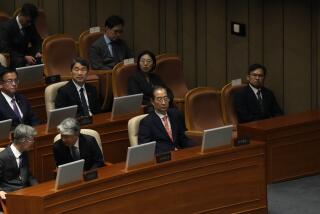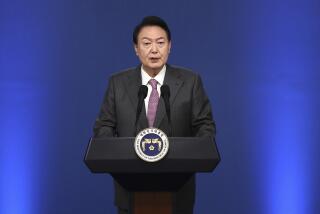He’s Trying to Nurture Democracy, S. Korean Leader Says
SEOUL — South Korean President Roh Tae Woo said Wednesday that he has intentionally refused to “impose democracy from the top” and will continue to refrain from exercising “public power” to solve the country’s mounting problems.
Democracy, he said, “is not something that can be forced upon the people” but must develop “through self-regulation and self-help” by people in all sectors of society.
Roh also spoke out against demands by some U.S. members of Congress that American forces stationed in South Korea be reduced, saying the troops have helped to maintain peace and stability for more than 35 years.
“There is an American saying,” Roh said. “If it ain’t broke, don’t fix it.”
Speaking in the first press conference he has given for foreign correspondents since assuming office in February, 1988, Roh made the statements on the eve of the two-year anniversary of his historic pledge to transform South Korea from authoritarian to democratic rule.
During the 1-hour 40-minute session, held in the guest house on the grounds of the presidential Blue House, Roh was asked to evaluate developments since his June 29, 1987, promise. He acknowledged that dissidents and opposition figures are complaining that “I have hardly done anything at all.”
But, pointing to labor strikes and often violent demonstrations, he said other Koreans claim that democratization has gone too far. “They ask, ‘How can we call a democracy without law and order a true democracy?’
“Many sound people say ‘what more could I have done?’ ” he added.
The ex-general, handpicked by former President Chun Doo Hwan to be his successor and then elected by a 37% plurality in 1987, said he regrets that Koreans “still lack the spirit of upholding law and order.”
Roh also said that Korea’s economy, which after three years of 12% real growth declined to a 5.7% gain in the first three months, faces “more trouble than expected” because of labor strife and wage increases that have totaled 62% since 1987.
Yet, in the belief that democracy must take root by the people’s own efforts, Roh said he has “exercised maximum restraint in using public power.”
Pledging to continue resisting calls for a crackdown, he refrained from threatening to impose the 10% limit on annual wage increases that he asked labor on June 19 to accept to restore competitiveness to exports.
It was the first time Roh has described his restraint as designed to nurture democracy in South Korea.
Roh dismissed claims that an American military presence here 36 years after the 1950-53 Korean War fuels anti-American sentiment. Such emotions, he said, are “chanted by” only a tiny, radical segment of society.
“A majority of the people share my view that America is the best and oldest ally we have,” Roh said.
Far from being a financial burden on the United States, as some U.S. congress members have charged, the maintenance of about 43,000 American troops here is “the wisest and most economic investment” U.S. tax dollars could buy, Roh said.
“It helps maintain freedom and peace in the Korean Peninsula and in this part of the world.”
Communist North Korea, rather than joining moves toward detente, “has refused to open up even one tiny bit,” Roh said. “To the contrary, it has introduced state-of-the-art weaponry from the Soviet Union and has kept its troops in a forward deployment ready to launch an instant offensive.”
Roh said he was “shocked” to learn that an opposition member of the National Assembly, Suh Kyung Won, had secretly visited Pyongyang last August. He told Korean reporters that several other opposition figures also are suspected of making secret visits to the North Korean capital.
Suh was arrested Wednesday by the Agency for National Security Planning, the former South Korean CIA. Security officials said he was charged with violating the National Security Law, which carries a maximum sentence of death.
Kim Dae Jung, president of the Party for Peace and Democracy, of which Suh is a member, issued a public apology and said his party will expel Suh, a former head of the dissident Catholic Farmers Union.
More to Read
Sign up for Essential California
The most important California stories and recommendations in your inbox every morning.
You may occasionally receive promotional content from the Los Angeles Times.










